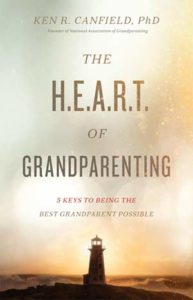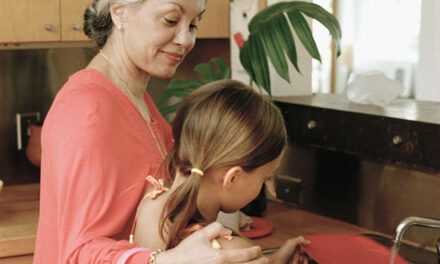by Dr. Ken Canfield
How can we deal with an elder or grandparent who was a negative role model?
In The HEART of Grandparenting, I share some details about my mother’s childhood. Her mother (my grandmother) left home at an early age and married a man who was much older, and they had four children together. Eventually they divorced and there were other men in the picture, and one of them told her, “I want you, but not your children.”

But God can use difficulties to bring about something positive, and I’m sure many of us have stories to back that up. And it’s a truth I believe we should share with our children and grandchildren.
In this case, my mother had a love/hate relationship with my grandmother, but eventually she decided to write to her and ask if she could live with her. My grandmother consented, no doubt feeling at least some guilt and remorse over abandoning her children.
It wasn’t an ideal situation for my mother, but it was much better than the orphanage. Despite the abandonment and hurt, they both found a measure of healing. As it turned out, my mom didn’t stay there long anyway. In a matter of months, she met my father, they married when she was 16, and two years later I came along. This wouldn’t have happened if my grandmother hadn’t been open to reestablishing a relationship with her daughter.
I didn’t learn of my grandmother’s life choices until I was in my early twenties, when I could better understand the wreck she had made of her life with the complicated family situation and the ever-present poverty. Something always seemed different with my grandmother, but as a child I lived in the moment and liked her because she was nice to me. And even later, after I knew more about her, I was able to move on from that and have a very positive connection to her until she passed.
All grandparents set an example for the people around us, including our grandkids, whether we intend to or not. That means there’s always the possibility that our children and grandchildren will notice and emulate negative behaviors, character flaws, and less desirable aspects of our personality. Obviously, we’d prefer not to pass those on as part of our legacy, but we can’t simply hide our human shortcomings and weakness, especially when they are connected to events from our family history.
If we are serious about the example we’re setting for our grandchildren, we should be willing to face the difficult memories, the regrets, the shameful acts we or other family members have done. (This look back at your life may encourage you to chart a new, more positive course for the future. It’s never too late.)
Bottom line, we all leave a mark on people’s lives through our example and conduct. Our goal as grandparents should be to live with integrity and honesty no matter what comes our way in life. There are no perfect grandparents, but we need to be willing to change our ways if we aren’t setting the best example we can for our grandchildren and, as much as it depends on us, give them every chance to thrive.
What changes have you made to be a better example for your grandkids? Please respond with a comment on our Facebook page.





